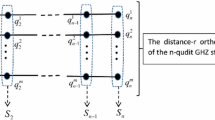Abstract
The concept of judgment space was proposed by Wang et al. (Phys. Rev. A 95, 022320, 2017), which was used to study some important properties of quantum entangled states based on local distinguishability. In this study, we construct 15 kinds of seven-qudit quantum entangled states in the sense of permutation, calculate their judgment space and propose a distinguishability rule to make the judgment space more clearly. Based on this rule, we study the local distinguishability of the 15 kinds of seven-qudit quantum entangled states and then propose a (k, n) threshold quantum secret sharing scheme. Finally, we analyze the security of the scheme.
Similar content being viewed by others
References
Bennett, C.H., Brassard, G.: In: IEEE Int. Conf. Comput., pp. 175–179. Bangalore (1984)
Hillery, M., Buzek, V., Berthiaume, A.: Quantum secret sharing. Phys. Rev. A 59, 1829 (1999)
Karlsson, A., Koashi, M., Imoto, N.: Quantum entanglement for secret sharing and secret splitting. Phys. Rev. A 59, 162 (1999)
Xiao, L., Long, G.L., Deng, F.G., Pan, J.W.: Efficient multiparty quantum-secret-sharing schemes. Phys. Rev. A 69, 052307 (2004)
Singh, S.K., Srikanth, R.: Generalized quantum secret sharing. Phys. Rev. A 71, 012328 (2005)
Zhang, Z.J., Li, Y., Man, Z.X.: Multiparty quantum secret sharing. Phys. Rev. A 71, 044301 (2005)
Gheorghiu, V., Sanders, B.C.: Accessing quantum secrets via local operations and classical communication. Phys. Rev. A 88, 022340 (2013)
Lu, H., Zhang, Z., Chen, L.K., Li, Z.D., Liu, C., Li, L., Liu, N.L., Ma, X., Chen, Y.A., Pan, J.W.: Secret sharing of a quantum state. Phys. Rev. Lett. 117, 030501 (2016)
Bai, C.M., Li, Z.H., Xu, T.T., Li, Y.M.: Quantum secret sharing using the d-dimensional GHZ state. Quantum Inf. Process. 16(3), 59 (2017)
Bai, C.M., Li, Z.H., Xu, T.T., Li, Y.M.: A generalized information theoretical model for quantum secret sharing. Int. J. Theor. Phys. 55(11), 4972–4986 (2016)
Pilaram, H., Eghlidos, T.: An efficient lattice based multi-stage secret sharing scheme. IEEE Trans. Depend. Secure Comput. 14, 2 (2017)
Tavakoli, A., Herbauts, I., Zukowski, M., Bourennane, M.: Secret sharing with a single d-level quantum system. Phys. Rev. A 92(R), 030302 (2015)
Karimipour, V., Asoudeh, M.: Quantum secret sharing and random hopping: Using single states instead of entanglement. Phys. Rev. A 92(R), 030301 (2015)
Arpita, M., Goutam, P.: A resilient quantum secret sharing scheme. Int. J. Theor. Phys. 54(2), 39,8–408 (2015)
Giovanni, D.C., Clemente, G.: Hypergraph decomposition and secret sharing. Discret. Appl. Math. 157(5), 928–946 (2009)
Fortescue, B., Gour, G.: Reducing the quantum communication cost of quantum secret sharing. IEEE Trans. Inf. Theor. 58, 6659 (2012)
Xu, T.T., Li, Z.H., Ma, M.: A new improvable quantum secret sharing scheme. J. Shandong University 52(3), 8–15 (2017)
Xu, T.T., Li, Z.H., Bai, C.M., Ma, M.: A new improving quantum secret sharing scheme. Int. J. Theor. Phys. 56, 1–10 (2017)
Wang, Q.H., Zhu, X.H., Dai, Y.W.: (k,n) threshold quantum secret sharing using the phase shift operation. Quantum Inf. Process 14(8), 2997–3004 (2015)
Wang, Q.H., Zhu, X.H., Dai, Y.W.: Verifiable (k,n) threshold quantum secret sharing using d-dimensional Bell state. Inf. Process. Lett. 116(5), 351–355 (2016)
Rahaman, R., Parker, M.G.: Quantum scheme for secret sharing based on local distinguishability. Phys. Rev. A 91, 022330 (2015)
Yang, Y.H., Gao, F., Wu, X., Qin, S.J., Zuo, H.J., Wen, Q.Y.: Quantum secret sharing via local operations and classical communication. Sci. Rep. 5, 16967 (2015)
Wang, J.T., Li, L.X., Peng, H.P., Yang, Y.X.: Quantum-secret-sharing scheme based on local distinguishability of orthogonal multiqudit entangled states. Phys. Rev. A 95, 022320 (2017)
Long, G.L., Liu, X.S.: Theoretically efficient high-capacity quantum-key-distribution scheme. Phys. A 65, 032302 (2002)
Li, C.Y., Zhou, H.Y., Wang, Y., Deng, F.G.: Secure quantum key distribution network with Bell states and local unitary operations. Chin. Phys. Lett. 22, 1049 (2005)
Li, C.Y., Li, X.H., Deng, F.G., Zhou, P., Liang, Y.J., Zhou, H.Y.: Efficient quantum cryptography network without entanglement and quantum memory. Chin. Phys. Lett. 23, 2896 (2006)
Deng, F.G., Long, G.L., Wang, Y., Xiao, L.: Increasing the efficiencies of random-choice-based quantum communication protocols with delayed measurement. Chin. Phys. Lett. 21, 2097 (2004)
Li, X.H., Deng, F.G., Zhou, H.Y.: Improving the security of secure direct communication based on the secret transmitting order of particles. Phys. Rev. A 74, 054302 (2006)
Deng, F., Li, X., Zhou, H., Zhang, Z.: Improving the security of multiparty quantum secret sharing against Trojan horse attack. Phys. Rev. A 72(4), 044302 (2005)
Cai, Q.Y.: Eavesdropping on the two-way quantum communication protocols with invisible photons. Phys. Lett. A 351(1), 23–25 (2006)
Acknowledgements
This work was sponsored by the National Natural Science Foundation of China under Grant No.61373150 and No.61602291, Industrial Research and Development Project of Science and Technology of Shaanxi Province under Grant No.2013k0611, and supported by “the Fundamental Research Funds for the Central Universities” under Grant No.GK201603087.
Author information
Authors and Affiliations
Corresponding author
Rights and permissions
About this article
Cite this article
Liu, CJ., Li, ZH., Bai, CM. et al. Quantum-Secret-Sharing Scheme Based on Local Distinguishability of Orthogonal Seven-Qudit Entangled States. Int J Theor Phys 57, 428–442 (2018). https://doi.org/10.1007/s10773-017-3574-5
Received:
Accepted:
Published:
Issue Date:
DOI: https://doi.org/10.1007/s10773-017-3574-5




